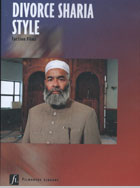
Divorce Sharia Style 2008
Distributed by Filmakers Library, 124 East 40th Street, New York, NY 10016; 202-808-4980
Produced by Peter Day and Ken Kirby; Faction Films
Directed by Masoud Khan
DVD, color, 49 min.
Jr. High - Adult
Human Rights, Women's Studies, Religion, Activism, Cultural Relations, Democracy, Law
Date Entered: 11/06/2009
Reviewed by Malcolm L. Rigsby, Department of Sociology, Ouachita Baptist University, Arkadelphia, ARIs there a place for both Sharia Law and Secular Law in modern society? The question begs a central consideration of a growing presence of those professing Islam in the western world. We journey with the director to Britain’s oldest Sharia Court. Divorce is a concern in all parts of the world, and is a growing concern not only in the secular world but in the Sharia world.
Although the film is relatively short it manages to cover several interviews of Sharia Court officials and individual Muslim couples caught up in seeking divorce. The film’s focus is primarily upon the rights of Muslim women to seek divorce where the husband is not agreeable. Maulana Abu Sayeed, President of the Islamic Sharia Council in Britain states that divorce is the greatest growing court matter and arises from young Muslims using religion to create an identity about what it means to be a “British-Muslim”. Of the two particular divorce cases we follow one is particularly vivid. This case involves the Islamic ability of a man to take more than one wife as long as he is able to provide for each and care for his children. We examine the case of Nasira the wife and cousin of Imram who become married as part of his parent’s arrangements. Imram is British and Nasira is Pakistani. Though they have been married six years and have several children he does not, nor as he admits has he ever loved Nasira. In turn rather than divorce and bring shame on the family he travels back to Pakistan and takes a second wife. This bifurcates his job, family life and brings objections from Nasira. Though she wants a divorce Imram will not agree. When she leaves she must return to the home. Meanwhile Imram cannot bring his second wife to Britain because of polygamy laws. The developments are interesting and the viewer will find the end of the film quite thought provoking.
Sharia argument is that it understands the culture that this type arrangement arises in and therefore is better suited to resolve these domestic matters better than secular law. Statistics are quoted that upward to forty percent of British Muslims want Sharia law to parallel secular law in Britain. As one interviewee in the film notes; this would greatly simplify matters if we were simply empowered to carry out Sharia law and execute removal of hands for certain crimes or stoning for adultery. In short he argues; this would reduce the need for prisons!
The question remains unanswered. Can two separate bodies of law co-exist? This film will surely generate much discussion and serve to shape questions for students and those interested in domestic life, women’s rights, religion and democracy.